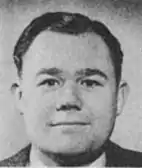Gerald Campion
Gerald Theron Campion (23 April 1921 – 9 July 2002) was an English actor best remembered for his role as Billy Bunter in a 1950s television adaptation (Billy Bunter of Greyfriars School) of books by Frank Richards (Charles Hamilton).[1]
Gerald Campion | |
|---|---|
 | |
| Born | Gerald Theron Campion 23 April 1921 |
| Died | 9 July 2002 (aged 81) |
| Alma mater | RADA |
| Occupation | Actor |
| Years active | 1938-1992 |
| Spouse(s) | Jean Sherman (1947–1972) (divorced) (3 children) Susan Mark (1973–2002) (his death) |
| Children | Ann, Anthony, Angelica |
| Parent(s) | Cyril Campion |
Biography
His father Cyril Theron Campion (1894-1961) – a playwright and screenwriter – and Blanche Louise Tunstall nee Bear (1890-1933) – a cousin-german of Charlie Chaplin – married in 1920 in London.[2] Campion was born in Bloomsbury, London, an only child.[3]
He won a place at RADA at age 15, and appeared in numerous films and television programmes – mostly comedies.[4] In 1937, he appeared in Tavs Neiiendam's radio play Inspiration to a Poet on the BBC Home Service.[5]
| Author | Tavs Neiiengam | ||
| Translated from the Danish by | Marianne Helweg | ||
| Produced by | M H Allen | ||
| James Lancaster, a parson and poet | Ronald Simpson | ||
| Rorke, Reporter | Eric Messiter | ||
| Harkness, Reporter | Leslie Perrins | ||
| Editor of the Morning Clarion | Laidman Brown | ||
| Johnson, a photographer | Geoffrey Wincott | ||
| Martha Duxbury, a café proprietress | Vivienne Chatterton | ||
| Joe Duxbury, her son | Philip Wade | ||
| Mrs Pratt, Lancaster's housekeeper | Fanny Wright | ||
| Announcers, Navvies, Typists, Newsboys, Telephone Operator and other voices | Gerald Campion Diana Lincoln David Bevan Beatrice Rowe Lucie Milner |
His only major success was as Bunter, a juvenile role he played successfully despite being much older than his character (he was 40 when the series ended).[7] Campion later reprised the role (now Lord Bunter of Hove, who had succeeded in betting shops and property) in the BBC Radio 7 series Whatever Happened to ...? in the episode that speculated on whether Bunter's form master at Greyfriars School, Horace Henry Samuel Quelch, became a secret agent.[8]
In 1979, he recorded an appearance in Shada, a Doctor Who story which was not completed in its intended form.[9]
After dropping out of acting, Campion ran clubs and restaurants in London's Soho, the best known of which is Gerry's, a long running private members' club attracting a mainly theatrical membership.[10][11]
Personal life
- First marriage with Jean M Sherman (Simmonds) (1925–) in London in 1947, ended in divorce, 1972.
- Anthea (a singer who married composer Thomas Rajna)
- Anthony 1948
- Angelica 1962
- Second marriage with Susan (Suzie) Marks in 1973.
He lived in Wittersham, Kent for many years. He and Suzie moved to France in 1991. He died in 2002 aged 81 in Agen, Aquitaine, France.[4]
Selected filmography
- The Drum (1938) – Soldier (uncredited)
- The Ghost of St. Michael's (1941) – Pupil at Rear of Class (uncredited)
- Take My Life (1947) – Newspaper Seller at Station (uncredited)
- Miranda (1948) – Lift Boy (uncredited)
- The Pickwick Papers (1952) – Joe, the Fat Boy
- Top of the Form (1953) – Pugley
- Knave of Hearts (1954) – Harry (uncredited)
- Up to His Neck (1954) – Skinny
- Fun at St. Fanny's (1956) – Fatty Gilbert
- Jumping for Joy (1956) – Man with Ice Cream (uncredited)
- Keep It Clean (1956) – Rasher
- Hergé's Adventures of Tintin (1957-58) (TV Show) – Tintin
- Carry On Sergeant (1958) – Andy Galloway
- Inn for Trouble (1960) – George
- School for Scoundrels (1960) – Proudfoot
- Double Bunk (1961) – Charlie
- Jigsaw (1962) – Glazier (uncredited)
- The Fast Lady (1962) – Actor in Scottish TV show
- A Home of Your Own (1964)
- The Comedy Man (1964) – Gerry
- Those Magnificent Men in their Flying Machines (1965) – Fireman (uncredited)
- The Sandwich Man (1966) – Fred – Sandwich Man in Suit of Armour
- The Sorcerers (1967) – Customer in China Shop
- Half a Sixpence (1967) – Fat Boy
- Chitty Chitty Bang Bang (1968) – Minister
- Atlantic Wall (1970) – Clergyman 2
- Little Dorrit (1987) – Mr. Tetterby
- Just Ask for Diamond (1988) – Uncle Holly
References
- ComicsUK 2002.
- Robinson 1985.
- Daily Telegraph 2002.
- BFI 2018.
- The Times, "Broadcasting: A Danish Play", 11 March 1937.
- Radio Times (11 Mar 1937), Inspiration to a Poet, 54, BBC National Programme, p. 72
- Dixon, Stephen (10 Jul 2002). "Obituary: Gerald Campion". the Guardian.
- "Horace Henry Samuel Quelch, Series 1, Whatever Happened to...? - BBC Radio 7". BBC.
- Campbell, Mark (24 Mar 2011). Doctor Who: The Complete Guide. Little, Brown Book Group. ISBN 9781849018869 – via Google Books.
- Simkins, Michael (11 Jul 2002). "Michael Simkins recalls an evening with actor Gerald Campion". the Guardian.
- Campion 2018.
Sources
- BFI (2018). "Gerald Campion".
- ComicsUK (4 Oct 2007). "Profile of Gerald Campion". Archived from the original on 4 Mar 2009.CS1 maint: ref=harv (link)
- Daily Telegraph (11 Jul 2002). "Gerald Campion". Archived from the original on 30 Oct 2014.CS1 maint: ref=harv (link)
- Campion, Angelica (9 Feb 2018). "My Dad, Gerald Campion". Hastings Independent Press. Archived from the original on 6 Sep 2018.CS1 maint: ref=harv (link)
- Robinson, David (1985). Chaplin: His Life And Art. McGraw-Hill. ISBN 978-0070531819.CS1 maint: ref=harv (link)